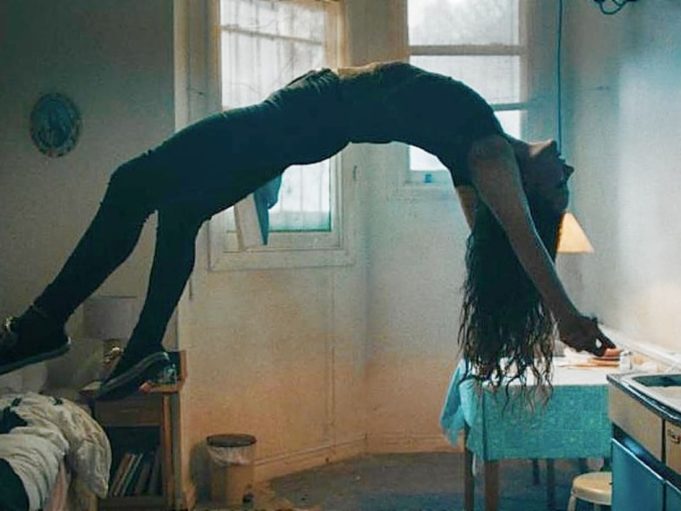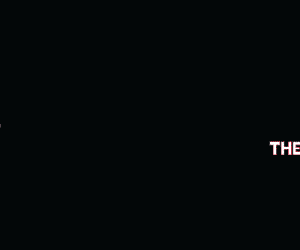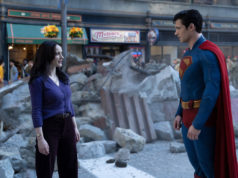What turns people into monsters? What convinces them that murder is the right thing to do? More than racial animus, more than political fanaticism, more than thwarted love, nothing seems quite as effective as religion. Recent movies have taken on women in the grip of religious mania and succeeded, whether they’re from a pagan cult (Midsommar) or a Christian apocalyptic sect (The Lodge). Now comes Saint Maud, which is possibly scarier than either of those. I drove all the way to Plano to catch it on the big screen, but you’ll probably have to settle for it on your TV monitor when it premieres on Epix this weekend. Regardless, you’ll find this British psychological study an unforgettable debut from a first-time director.
Morfydd Clark plays the titular Maud, a Welsh hospice nurse in an English seaside town who has been assigned to care for Amanda (Jennifer Ehle), a chain-smoking gay American former dancer, choreographer, and author of several books. An atheist with a history of depression who’s now paralyzed and dying from spinal cord lymphoma, Amanda admits fearing what comes after death, and recently converted Christian Maud resolves to save her soul. An amused Amanda calls her “my little savior,” the first of several things she does that you shouldn’t do in front of someone who claims that God physically enters her body.
Clark is a short-statured Welsh actress whose fine porcelain voice and sharp features have gotten her cast in period comedies such as Love & Friendship and The Personal History of David Copperfield. Those roles will hardly prepare you for the first we see of Maud, crouching on the floor of a hospital OR and staring blankly while covered in someone else’s blood. Maud is wound extra-tight, and the numerous cuts on her abdomen indicate her tendency toward self-flagellation. Clark makes Maud painfully aware that she’s out of place whether she’s with Amanda’s artist friends or the crowd at a pub, where Maud (who has temporarily fallen out with God) drinks a beer with grim determination.
No less unsettling are her religious visions, which make her vomit and piss herself in ecstasy. As a sex scene involving a random guy make clear, God is the only partner who can give her an orgasm. That scene also obliquely refers to a traumatizing incident at the aforementioned hospital that precipitated Maud’s conversion and explains why she’s cut off from the world. In a rare moment of sensitivity, Amanda tells her, “You must be the loneliest girl I’ve ever seen.” Then, too, when Maud tells Amanda’s girlfriend of the moment (Lily Frazer) to stop coming round the house, Clark’s quick undertone shows us the strength of her determination. Even casual conversations with another carer (Rosie Sansom) or a former co-worker (Lily Knight) who knew Maud before she was a Christian and calls her “Katie” are infused with the threat of violence. This is a showcase role for an actress, and Clark does not waste her chance.
Neither does Rose Glass, the 30-year-old British director from the world of TV commercials. She displays some formidable skills with the way she captures the dingy seaside resort and Maud’s cockroach-infested one-room flat. One of those roaches literally leads Maud to God, who speaks to her from the wall of her flat in Welsh, an inspired choice. Then there’s that sex scene, which turns from consensual to rape in a matter of seconds, something Glass depicts with casual cruelty. In a climactic sequence when Maud breaks into Amanda’s house to convert her once and for all, Glass has her walk down a hallway with pools of light that cast her face alternately in light and shadow. Adam Janota Bzowski’s strictly metrical score brings a rhythm to the shots and the story as well.
Whereas horror is often about managing set pieces, Glass unlocks a more difficult achievement in creating a constant sense that something truly horrible is about to happen. Of course, this works best when it occasionally pays off, and it does here, especially when Maud pokes thumbtacks through the insoles of her shoes and then impales her bare feet on them. By the way, Maud’s personal mantra is, “Don’t waste your pain.”
Maybe the operative comparison here isn’t Midsommar or The Lodge but rather Black Swan. Rose Glass has Darren Aronofsky’s ability to crawl inside her protagonist’s messed-up head and plunge us mercilessly into a nightmare without giving us any time to catch our breath. A woman filmmaker with that particular set of talents is something to look out for in the future. Saint Maud ends with our protagonist wearing a bedsheet that she has fashioned into a prayer shawl and singing Hank Williams’ “I Saw the Light” while preparing for her final act of self-immolation. Glass and Clark make this into a haunting meditation on the damage that a person can do when she’s convinced she’s carrying out God’s will.
Saint Maud
Starring Morfydd Clark and Jennifer Ehle. Written and directed by Rose Glass. Rated R.












